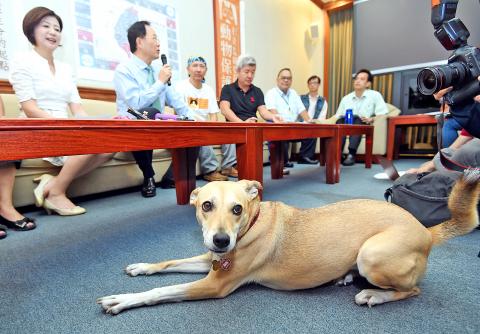The adoption of stray animals should be included in evaluations of school performance, animal rights advocates said yesterday, announcing the results of a national survey of school adoptions.
“When the Ministry of Education evaluates a school’s ‘life education,’ one of the measures it should include is whether they have adopted a stray animal,” Animal Protection Administration Oversight Committee board member Wang Wei-chi (王唯治) told a press conference in Taipei.
“You can not just say there are exams on related material, you need to show cases demonstrating that your ‘life education’ is a success,” Wang said.

Photo: Liao Chen-huei, Taipei Times
In addition to adopting stray animals, schools could also be evaluated based on how many students were involved in caring for the animal and reports on what they had learned, he said.
Wang added that schools were the key to increasing animal adoption rates. By familiarizing students with the needs of adopted animals and also increasing parents confidence that their children could be responsible for an animal’s care, more animals might be adopted.
He said that more than 90,000 stray animals were caught last year nationally, with many animals euthanized if they are not adopted within 15 days.
Life Conservationist Association executive director Ho Tsung-hsun (何宗勳) said that with the euthanasia of animals scheduled to be banned in two years, the group has been working to promote animal adoption, focusing on neighborhoods as well as the nation’s 3,885 elementary and secondary schools.
A survey conducted by the group showed that about 6 percent of the nation’s schools have adopted a cat or a dog, with 12 percent of high schools and middle schools raising a pet, compared with only 3 percent of elementary schools.
Keelung had the highest adoption rate of 18.2 percent, while Taipei had the lowest at 3.5 percent.
Ministry of Education offical Chiu Jen-chieh (邱仁杰) said the ministry had already passed regulations regarding animals being adopted by schools and includes animal protection information in the school curriculum.

Taiwan is stepping up plans to create self-sufficient supply chains for combat drones and increase foreign orders from the US to counter China’s numerical superiority, a defense official said on Saturday. Commenting on condition of anonymity, the official said the nation’s armed forces are in agreement with US Admiral Samuel Paparo’s assessment that Taiwan’s military must be prepared to turn the nation’s waters into a “hellscape” for the Chinese People’s Liberation Army (PLA). Paparo, the commander of the US Indo-Pacific Command, reiterated the concept during a Congressional hearing in Washington on Wednesday. He first coined the term in a security conference last

Prosecutors today declined to say who was questioned regarding alleged forgery on petitions to recall Democratic Progressive Party (DPP) legislators, after Chinese-language media earlier reported that members of the Chinese Nationalist Party (KMT) Youth League were brought in for questioning. The Ministry of Justice Investigation Bureau confirmed that two people had been questioned, but did not disclose any further information about the ongoing investigation. KMT Youth League members Lee Hsiao-liang (李孝亮) and Liu Szu-yin (劉思吟) — who are leading the effort to recall DPP caucus chief executive Rosalia Wu (吳思瑤) and Legislator Wu Pei-yi (吳沛憶) — both posted on Facebook saying: “I

The Ministry of Economic Affairs has fined Taobao NT$1.2 million (US$36,912) for advertisements that exceed its approved business scope, requiring the Chinese e-commerce platform to make corrections in the first half of this year or its license may be revoked. Lawmakers have called for stricter enforcement of Chinese e-commerce platforms and measures to prevent China from laundering its goods through Taiwan in response to US President Donald Trump’s heavy tariffs on China. The Legislative Yuan’s Finance Committee met today to discuss policies to prevent China from dumping goods in Taiwan, inviting government agencies to report. Democratic Progressive Party Legislator Kuo Kuo-wen (郭國文) said

The Ministry of Economic Affairs has fined Taobao NT$1.2 million (US$36,900) for advertisements that exceeded its approved business scope and ordered the Chinese e-commerce platform to make corrections in the first half of this year or its license would be revoked. Lawmakers have called for stricter supervision of Chinese e-commerce platforms and more stringent measures to prevent China from laundering its goods through Taiwan as US President Donald Trump’s administration cracks down on origin laundering. The legislature’s Finance Committee yesterday met to discuss policies to prevent China from dumping goods in Taiwan, inviting government agencies to report on the matter. Democratic Progressive Party